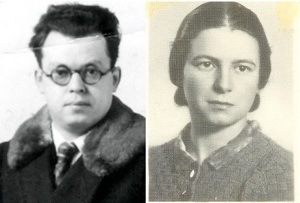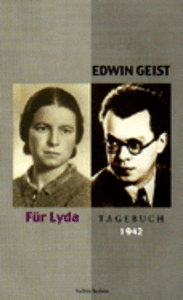In the face of the Holocaust trauma 0
The life stories of German composer Edwin Geist and his Lithuanian-Jewish wife Lyda Geistienė are special and unique like everyone's who died in the Holocaust. However one aspect sets the Geist family apart from the other victims - it is the diary of E. Geist that certifies the greatness and altogether a fragility of human dignity.
Composer Edwin Geist was born in Germany in 1902, he taught music education, and he met the Lithuanian-Jewish student Lyda Bagrianskytė in Berlin Music Academy. In 1938 the couple emigrated to the then free from Nazies Lithuania. For four years Edwin and Lyda were building their present and future plans in thriving interwar Kaunas.
Unfortunately, after the Nazis occupied Lithuania in spring 1942, paradise in Lithuania was over. In spring 1942 E. Geist and L. Geistienė were arrested and taken to a Jewish ghetto. Before the Palm Sunday of that year E. Geist regained his freedom with the help from his friends, but his wife remained there. A week before Easter began a period in E. Geist life, which deserves the most attention - composer, tortured by longing started writing a diary. Very accurate, emotional, full of love to his wife and facts that reveal E. Geist’s efforts to free Lyda from Captivity.
Then began a long process, which lasted until 1942, August 31st, when L. Geistienė was liberated from the ghetto. To achieve this E. Geist was helped only by a few people, but their voices were of utmost importance. They were: doctor from Prienai Juozas Brundza, Vanda Vabalienė and a friend František Vocelka.
The recovered freedom of L. Geistienė and happiness with her husband Edwin did not last long. L. Geistienė refused to be sterilized (Gestapo forced Jewish people to do so, for they would not have offspring) and E. Geist refused to write music that would glorify Reich. Their disloyalty to the regime was the reason why E. Geist was arrested in 1942 December 10th and this time shot to death. E. Geistienė, not being able to handle the pain, soon committed suicide.
The diary, which is named with a single and most important word "For Lyda", does not contain almost any literary images - it is dominated by the auditory experience. Verbal language without metaphors and notes of the musical notes or writing about music. This suggests another idea - a person in danger can be helped not only by a conversation with an imaginary other, but also by music. While writing the diary, E. Geist did not stop creating, he continued writing his musical opuses. A person who has experienced trauma would usually lose his creative skills.










